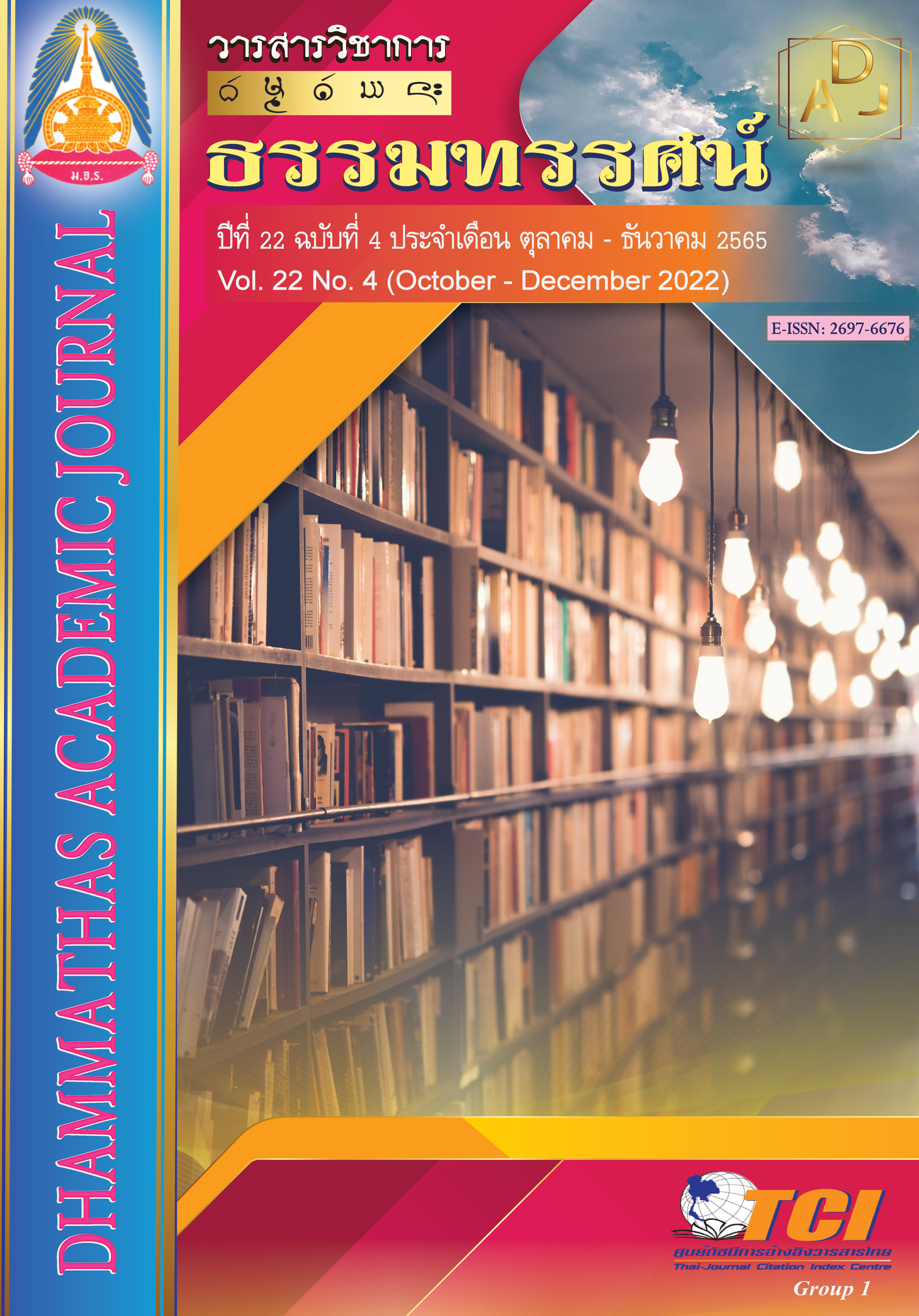Application of King's Philosophy to Analysis of Community Problems in Nakhon Pathom Province
Main Article Content
Abstract
This research aim is 1) to disseminate the knowledge of the King's Philosophy to volunteer groups and 2) to study the application of the King's Philosophy and community empowerment to analyze problems within the community. Using qualitative research, the key informant was the volunteer group of the Phutthamonthon, Nakhon Chai Si, and Sampran districts, a total of 34 people selected by purposive sampling. Research tools include documentary research, focus group interviews, non-participant observation, and descriptive analysis.
The study found that:
1. After training on applying the King's Philosophy, especially the principle of "understanding, connecting and development”. They defined understandingas understanding the problems that arise in each community and the state of the community through clear information. The principle of connectingis visiting villages, asking about the problem's condition, and sincerely coming to help with unconditional love. And the principle of development is that there is training at local learning centers.
2. The community problem analysis found that the volunteer groups of Phutthamonthon District and Sampran District considered the "waste problem" an urgent and important problem and could create activities under the volunteer group to solve the problem. Both areas face the same problem because they are adjacent to the capital city. And the Nakhon Chai Si District volunteer group voted for the “Tha Chin River encroachment problem” which is an urgent problem, and activities can be created under the volunteer group to solve the problem. Finally, found that the volunteer group was a group of people who had strengths in social capital. When organizing activities to increase community potential or to solve community problems in the future, it often receives good cooperation from government agencies.
Article Details

This work is licensed under a Creative Commons Attribution-NonCommercial-NoDerivatives 4.0 International License.
เพื่อให้เป็นไปตามกฎหมายลิขสิทธิ์ ผู้นิพนธ์ทุกท่านต้องลงลายมือชื่อในแบบฟอร์มใบมอบลิขสิทธิ์บทความ ให้แก่วารสารฯ พร้อมกับบทความต้นฉบับที่ได้แก้ไขครั้งสุดท้าย นอกจากนี้ ผู้นิพนธ์ทุกท่านต้องยืนยันว่าบทความ ต้นฉบับที่ส่งมาตีพิมพ์นั้น ได้ส่งมาตีพิมพ์เฉพาะในวารสาร วิชาการธรรม ทรรศน์ เพียงแห่งเดียวเท่านั้น หากมีการใช้ ภาพหรือตารางของผู้นิพนธ์อื่นที่ปรากฏในสิ่งตีพิมพ์อื่นมาแล้ว ผู้นิพนธ์ต้องขออนุญาตเจ้าของลิขสิทธิ์ก่อน พร้อมทั้ง แสดงหนังสือที่ได้รับการยินยอมต่อบรรณาธิการ ก่อนที่บทความจะได้รับการตีพิมพ์References
กลุ่มงานยุทธศาสตร์และข้อมูลเพื่อการพัฒนาจังหวัดนครปฐม. (2561). แผนพัฒนาจังหวัดนครปฐม 4 ปี (พ.ศ. 2561-2564). นครปฐม: สำนักงานจังหวัดนครปฐม.
คณะกรรมการขับเคลื่อนสืบสานศาสตร์พระราชา. (2560). การขับเคลื่อนสืบสานศาสตร์พระราชาเพื่อปฏิรูปประเทศ. กรุงเทพฯ: สำนักงานเลขาธิการสภาผู้แทนราษฎร.
ณัฐนิชา ศรีบริบูรณ์. (2550). การพัฒนาโมเดลเชิงสาเหตุของจิตอาสาของนักเรียนมัธยมศึกษาตอนปลาย ในโรงเรียนสังกัดคณะกรรมการการศึกษาขั้นพื้นฐาน. กรุงเทพฯ: จุฬาลงกรณ์มหาวิทยาลัย.
นงพิมล นิมิตรอานันท์ และคณะ. (2563). การเสริมพลังชุมชน: มโนทัศน์และการประยุกต์ในการปฏิบัติการพยาบาลเวชปฏิบัติชุมชน. วารสารการพยาบาลและสุขภาพ, 14(1), 13-23.
ปิ่นกนก สงศ์ปิ่นเพ็ชร์ และคณะ. (2553). ปัจจัยที่เกี่ยวข้องกับจิตอาสาของนักศึกษามหาวิทยาลัยเทคโนโลยีพระจอมเกล้าพระนครเหนือ. วารสารวิชาการศิลปศาสตร์ประยุกต์, 3(1), 9-16.
ลักษิกา สมจิตร และปรุตม์ บุญศรีตัน. (2563). การพัฒนาคุณภาพชีวิตที่ยั่งยืนตามแนวคิดของมูลนิธิปิดทองหลังพระสืบสานแนวพระราชดำริ จังหวัดน่าน. วารสารปณิธาน, 16(2), 16-34.
อภิชิต ดวงธิสาร และคณะ. (2563). ศาสตร์พระราชากับการสร้างความเข้มแข็งให้กับชุมชน: กรณีศึกษาองค์การบริหารส่วนตำบลสระพัง อำเภอบ้านแท่น จังหวัดชัยภูมิ. วารสารวิชาการมหาวิทยาลัยปทุมธานี, 12(2), 165-180.
Alinsky, S. D. (1989). Ruler for Radicals: A Pratical Primer for Realist Radicals. New York: A division of Random House Inc.
Arifudin, Besri, N. and Maswadi. (2013). Program of Community Empowerment Prevents Forest Fires in Indonesian Peat Land. Procedia Environmental Sciences, 17, 129-134.
Brinkerhoff, D. W. and Omar A. (2006). Decentralization and Community Empowerment: Does community empowerment deepen democracy and improve service delivery?. Washington, DC: U.S. Agency for International Development Office of Democracy and Governance.
Freire, P. (1986). Pedagogy of the Oppressed. Middlesex: Penguin Books.
Ife, J. (2015). Community Development in an UncertainWorld: Vision, Analysis and Practice. Melbourne: Cambridge University Press.
Laverack, G. (2007). Health Promotion Pratice: Buildig Empower Communities. Berkshire: Open University Press.

